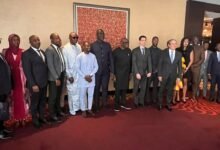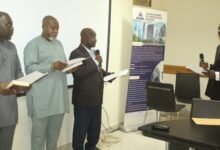
The United Nations (UN) has cautioned Ghanaians against hate speech and violent practices that has the potential to disrupt peace and security in the build-up to this year’s general elections.
Charles Abani, UN Resident Coordinator in Ghana, explained that the country risks eroding her democratic gains over the past decades and destabilising its peace and respect for rule of law if hate speech was allowed to creep into its body politics.
He said Ghana, which was globally regarded as a beacon of hope for the African continent, must denounce hate speech while consolidating its democracy and strive to maintain the existing peace and the rule of law as political activities intensify.
Speaking at the launch of the 75th UN Day and anniversary celebrations in Accra yesterday, Mr Abani said the UN was confident that Ghana would emerge winner at the end of the electioneering exercise.
“Ghana is an inspiration and a beacon of hope across Africa and an example to the rest of the world. Let us all ensure the maintenance of mutual respect and tolerance; let us denounce hate speech and promote peace and the rule of law; and let us remember that the gains made can only be sustained for the good of all Ghanaians only if Ghana wins,” he stated.
This year’s event, organised in collaboration with the Ministry of Foreign Affairs and Regional Integration, is on the theme “Shaping the Future Together- Ghana and the United Nations.”
The Resident Coordinator commended Ghana for being a frontline contributor to the global efforts to peace saying that the country had more than 3,000 personnel serving in eight missions across the world.
He further lauded the country’s pioneering role in the attainment of the Sustainable Development Goals (SDGs) and noted that the UN would work with Ghana to consolidate the SDG financing landscape in the country, strengthen infrastructure financing and delivery of bankable projects, and other initiatives.
Despite the damage caused by the coronavirus disease (COVID-19) pandemic on the global economy, Mr Abani said the world could still overcome prevailing socio-economic challenges including poverty and inequality, human right abuses and political instability, through a united multilateral solidarity and action.
“We must find the multilateral resolve to mobilise the resources necessary to offset the setbacks of COVID-19. This will require bold, innovative steps everywhere built on trust and solidarity. In celebrating the 75 years, we must also reflect soberly and adjust and shape the UN we need moving forward. If we must reimagine the world we will live in because of COVID-19 and climate change, then we must reimagine the UN that will help support this,” he added.
The Deputy Minister of Foreign Affairs and Regional Integration, Mr Charles Owiredu, reiterated calls for reforms carried at the UN Security Council, to make it more broadly representative, efficient and effective as well as reflect the current geopolitical realities.
He said when the Charter that established the UN was signed 75 years ago, the world was different from what exist today adding that the reform was necessary to make it fit for purpose.
As a member state, he noted that Ghana has played key roles in norm-setting, capacity-building and advocacy in human rights and respect for international law at the UN and has consistently made respect for human rights, peace, democracy and the rule of law top of its national agenda.
BY CLAUDE NYARKO ADAMS







